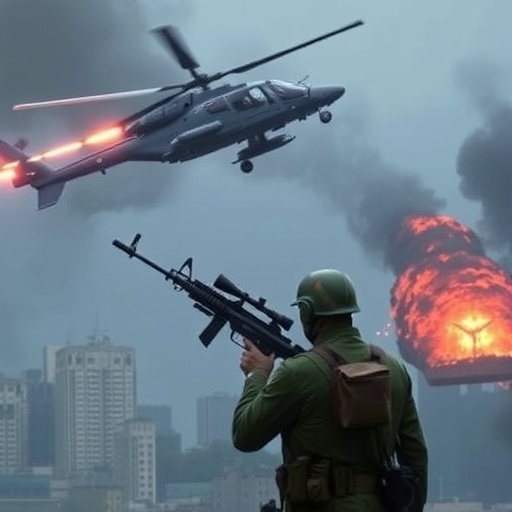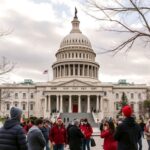Trump Administration Launches Intense Military Strikes on Drug Smugglers Near Venezuela, Sparking Diplomatic Crisis
In a bold escalation of its war on drugs, the Trump administration has authorized a series of high-stakes military strikes targeting suspected drug-smuggling vessels in the Caribbean, just miles from Venezuela’s coastline. This aggressive move, revealed through declassified Pentagon reports, comes amid heightened tensions with Caracas and has already drawn sharp rebukes from Latin American leaders, raising fears of a broader regional conflict.
The operations, which began intensifying in early 2020, mark a significant departure from previous diplomatic approaches to the Venezuelan crisis. U.S. Navy and Coast Guard units have intercepted and destroyed at least 12 vessels in the past month alone, according to official statements from the Department of Defense. These actions are part of a larger strategy to disrupt cocaine trafficking routes that funnel billions of dollars worth of narcotics into the United States, with Venezuela serving as a key transit point for Colombian cartels.
President Trump, in a recent address from the White House, defended the strikes as “necessary to protect American lives from the poison pouring in from failed states like Venezuela.” His words underscore the administration’s zero-tolerance stance on drug operations, but they have also inflamed diplomatic relations, with Venezuelan President Nicolás Maduro labeling the incursions as “acts of war.”
High-Seas Interceptions Disrupt Major Cartel Networks
The recent military strikes have yielded dramatic results, crippling several high-profile drug operations linked to Venezuela’s shadowy networks. On March 15, a U.S. destroyer in the waters off Isla de Margarita fired warning shots at a speedboat carrying over 1,500 kilograms of cocaine, valued at approximately $50 million on the street. The vessel, believed to be operated by the Cartel of the Suns—a Venezuelan military faction allegedly involved in trafficking—fled into international waters but was ultimately sunk after refusing to heave to.
According to a leaked intelligence brief from the Drug Enforcement Administration (DEA), these operations have seized more than 10 tons of narcotics since January, a 40% increase from the previous year. “We’re hitting them where it hurts,” said DEA Administrator Uttam Dhillon in an exclusive interview. “Venezuela’s role in global drug trafficking can’t be ignored; it’s fueling violence on our streets and destabilizing the hemisphere.”
Statistics paint a grim picture of the crisis: The United Nations Office on Drugs and Crime estimates that 90% of cocaine entering the U.S. passes through Central America and the Caribbean, with Venezuelan ports like Puerto Cabello serving as critical hubs. The Trump administration’s strategy involves not just strikes but also advanced surveillance, including drone patrols and satellite tracking, to monitor smuggling routes in real-time.
One particularly tense incident involved a nighttime raid on February 28, where Coast Guard helicopters boarded a fishing trawler 20 miles from Venezuela’s border. Crew members, armed and resistant, were subdued after a brief firefight, leading to the arrest of five suspects with ties to Hezbollah operatives reportedly using Venezuelan territory for money laundering. This intersection of drug operations and terrorism has justified the escalation, officials say, though it risks drawing the U.S. deeper into Venezuela’s internal strife.
Venezuela’s Fiery Response Ignites Diplomatic Standoff
Venezuela has responded to the Trump administration’s military strikes with a torrent of diplomatic fury, accusing the U.S. of violating international law and territorial sovereignty. In a televised speech on March 20, President Maduro declared, “These Yankee aggressions will not go unanswered; we will defend our waters with every resource at our disposal.” Venezuelan state media has broadcast footage of military drills along the coast, showcasing Russian-supplied Sukhoi jets and anti-ship missiles as a direct warning.
The diplomatic pushback extends beyond rhetoric. Caracas has lodged formal protests with the United Nations Security Council and the Organization of American States (OAS), demanding an immediate halt to what it calls “imperialist incursions.” Venezuelan Foreign Minister Jorge Arreaza went further, telling reporters in Havana, “The Trump regime’s drug operations are a pretext for regime change; they’re using military strikes to provoke us into a corner.”
Behind the scenes, tensions are boiling over into tangible actions. Venezuela has increased patrols in its exclusive economic zone, leading to several near-misses with U.S. vessels. A notable standoff occurred on March 10, when a Venezuelan frigate shadowed a U.S. Coast Guard cutter for hours, forcing the American ship to alter course. Experts warn that such escalations could spiral into accidental engagements, reminiscent of Cold War-era naval brinkmanship.
The U.S. embassy in Caracas, already operating under reduced staff due to sanctions, has seen Venezuelan authorities restrict movements of American diplomats, further straining bilateral ties. This diplomatic freeze comes at a precarious time, as the Trump administration balances its anti-drug agenda with efforts to rally international support against Maduro’s government.
Trump’s War on Drugs: From Campaign Promise to Caribbean Showdown
President Trump’s intensification of drug operations traces back to his 2016 campaign pledges to build a wall and crack down on narcotics flowing from Latin America. Under his leadership, the administration has allocated an additional $1.2 billion to interdiction efforts, including the expansion of Joint Interagency Task Force South (JIATF-S), which coordinates military strikes across the region.
Key to this strategy is the designation of Venezuela as a primary threat. In 2019, the State Department sanctioned over 100 Venezuelan officials for their alleged roles in drug trafficking, freezing assets and barring travel. “Trump’s approach is multifaceted—sanctions, diplomacy, and now direct action,” noted Heather Nauert, former State Department spokesperson. “It’s about sending a message that narco-states won’t be tolerated.”
Yet, the shift toward military strikes represents a hardening of policy. Previously, operations focused on aerial surveillance and partnerships with allies like Colombia. Now, with Venezuela’s economy in freefall—hyperinflation exceeding 1 million percent in 2018—desperation has turned ports into smuggling havens. A 2020 report by the Congressional Research Service highlights how U.S. aid cuts to Venezuela have inadvertently boosted black-market activities, complicating drug operations.
Critics within the U.S., including some Republican senators, argue that the strikes risk alienating potential allies. “While I support Trump’s tough stance on drugs, we can’t let military actions derail diplomacy,” said Sen. Marco Rubio (R-FL) during a Senate hearing. Rubio, a vocal Venezuela hawk, emphasized the need for coordinated efforts with hemispheric partners to avoid unilateral overreach.
Public opinion polls reflect divided sentiments: A recent Gallup survey shows 62% of Americans approve of increased military involvement in anti-drug efforts, but only 45% support actions near adversarial nations like Venezuela. This tension underscores the political tightrope Trump walks as he eyes re-election.
Regional Powers Weigh In on Escalating Tensions
The Trump administration’s military strikes have reverberated across Latin America, prompting a chorus of concerns from regional powers wary of U.S. interventionism. Colombia, a key U.S. ally in the drug war, has expressed unease despite its own battles with cartels. President Iván Duque stated in a joint press conference with U.S. Secretary of State Mike Pompeo, “We applaud the fight against drug operations, but strikes so close to Venezuela could destabilize our shared borders.”
Brazil, under President Jair Bolsonaro, has offered cautious support, deploying its navy to assist in patrols but stopping short of endorsing strikes. “Diplomacy must temper military action,” Bolsonaro remarked, highlighting Brazil’s own interests in Venezuelan refugees straining its northern frontier.
Further afield, Mexico and Cuba have voiced stronger opposition. Mexican President Andrés Manuel López Obrador warned that “unilateral military strikes erode trust in multilateral diplomacy,” referencing his nation’s ongoing cooperation with the U.S. on border security. Cuba, a Venezuelan ally, has accused Washington of hypocrisy, pointing to domestic opioid crises as evidence of failed policies.
The European Union, through High Representative Josep Borrell, called for de-escalation, urging all parties to resume talks under the Lima Group framework. “The path to resolving Venezuela’s crisis lies in dialogue, not destruction at sea,” Borrell said in Brussels. These voices amplify the diplomatic challenges facing Trump, as allies push for a balanced approach amid the chaos of drug operations.
Non-governmental organizations like Human Rights Watch have raised alarms over potential civilian casualties. In one disputed incident, a struck vessel was reportedly carrying migrants alongside drugs, though U.S. officials deny knowledge. “Military strikes in populated waters demand utmost caution,” said a HRW spokesperson, calling for independent investigations.
Path Forward: Balancing Security and Stability in the Hemisphere
As the dust settles from the latest military strikes, the Trump administration faces critical choices in sustaining its momentum against drug operations without igniting a full-blown crisis with Venezuela. Upcoming summits, including the next OAS General Assembly in June, offer platforms for diplomacy to temper the aggression. Secretary Pompeo has hinted at new incentives for countries cooperating on interdictions, potentially including economic aid packages to offset Venezuelan refugee burdens.
Intelligence analysts predict that cartels may adapt by shifting routes to the Pacific or using submarines, necessitating evolved U.S. tactics. The Pentagon is investing $500 million in next-gen maritime drones to enhance surveillance, aiming to reduce the need for direct confrontations.
Looking ahead, the interplay of military strikes and diplomacy could redefine U.S.-Latin America relations. If Trump can secure broader coalitions—perhaps enlisting the UK and Canada for joint patrols—the operations might yield lasting disruptions to trafficking networks. However, persistent Venezuelan resistance risks sanctions escalation or even covert support from Russia and Iran, complicating the geopolitical chessboard.
Ultimately, the success of these efforts hinges on addressing root causes: Venezuela’s humanitarian disaster and political deadlock. As one State Department official confided anonymously, “We’re winning battles at sea, but the war on drugs demands victories on land through sustained diplomacy.” With midterm elections looming and global eyes on the Caribbean, Trump’s next moves will shape not just anti-drug strategies but the hemisphere’s future stability.








